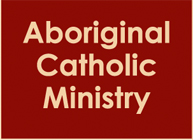- The following Calendar of Events provides key events and resources that would be helpful for research, projects and study.
- National and regional events are held to acknowledge significant occasions. The events listed provide information on a National level but make sure you contact your local Aboriginal Catholic Ministry office to find out what is happening in your community.
- Aboriginal and Torres Strait Islander persons are warned that the following section may contain images and names of deceased persons.
Jan | Feb | Mar | Apr | May | Jun | Jul | Aug | Sep | Oct | Nov | Dec
January
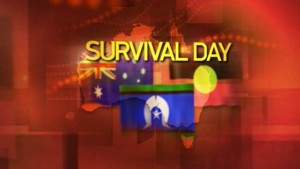 Australia Day/Survival Day
Australia Day/Survival Day
January 26
Is it Survival Day or Australia Day? Is it a commemoration or celebration? Was it Settlement or Invasion? But for Australia Day to have relevance to both points of view, it must be all embracing. More →
February
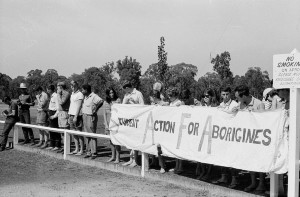 Freedom Ride journey through NSW country towns to raise awareness of racism against Aborigines (1965)
Freedom Ride journey through NSW country towns to raise awareness of racism against Aborigines (1965)
February 12
In February 1965 a group of University of Sydney students organised a bus tour of western and coastal New South Wales towns. Their purpose was to draw public attention to the poor state of Aboriginal health, education and housing; lessen the socially discriminatory barriers which existed between Aboriginal and white residents… More →
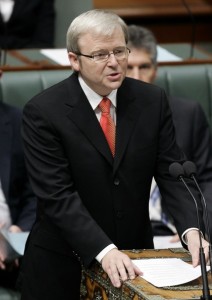 Apology Day to Stolen Generation (2008)
Apology Day to Stolen Generation (2008)
13 February
Prime Minister Kevin Rudd, MP – Apology to Australia’s Indigenous peoples. “I move: That today we honour the Indigenous peoples of this land, the oldest continuing cultures in human history. We reflect on their past mistreatment. We reflect in particular on the mistreatment of those who were Stolen Generations – this blemished chapter in our nation’s history… Read the full transcript →
April
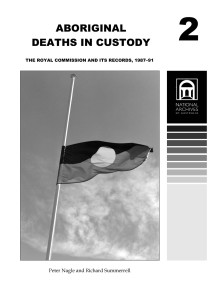 Aboriginal deaths in custody Royal Commission report (signed 1991)
Aboriginal deaths in custody Royal Commission report (signed 1991)
April 15
The Royal Commission produced a number of reports, including individual reports for each death investigated. These were presented separately as they were completed. The final report, signed on 15 April 1991, made 339 recommendations, mainly concerned with procedures for persons in custody, liaison with Aboriginal groups, police education and improved accessibility to information. More →
May
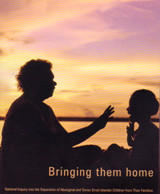 Bringing them Home report released (1997)
Bringing them Home report released (1997)
May 25
A report for the National Inquiry into the Separation of Aboriginal and Torres Strait Islander Children from their Families. This report is a tribute to the strength and struggles of many thousands of Aboriginal and Torres Strait Islander people affected by forcible removal. We acknowledge the hardships they endured and the sacrifices they made. More →
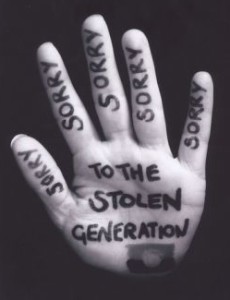 National Sorry Day
National Sorry Day
May 26
National Sorry Day was born out of a key recommendation made by the National Inquiry into the Separation of Aboriginal and Torres Strait Islander children from their families in the Bringing them home Report that was tabled in Federal Parliament on 26 May 1997. National Sorry Day is an annual day of remembrance of all those who have been impacted by the government policies of forcible removal that have resulted in the Stolen Generations. More →
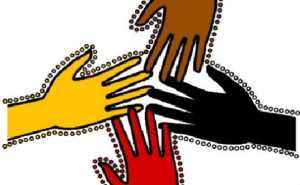 National Reconciliation Week begins
National Reconciliation Week begins
May 27
National Reconciliation Week is celebrated across Australia each year from 27 May to 3 June. The dates commemorate two significant milestones in the reconciliation journey—the anniversaries of the successful 1967 referendum and the High Court Mabo decision. More →
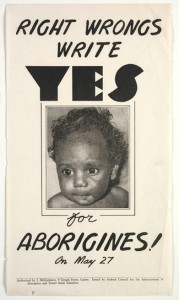 Federal government granted citizen rights to Aboriginal people
Federal government granted citizen rights to Aboriginal people
May 27
Up until the amendment of the Commonwealth Electoral Act in 1962, Aboriginal people have been denied citizenship rights and the following report highlights some of the initiatives they have taken in their struggle to gain the rights that other Australians have already been granted. An appreciation of this struggle requires some understanding of what citizenship rights are and who has the power to bestow or withhold them. More →
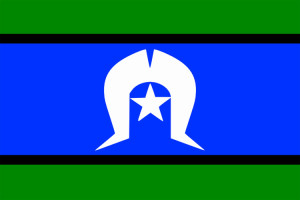 Torres Strait Island flag launched
Torres Strait Island flag launched
May 29
The Torres Strait Islander Flag was adopted in May 1992 during the Torres Strait Islands Cultural Festival. The green panels at the top and bottom of the flag represent the land and the central blue panel represents the sea. The black lines dividing the panels represent the Torres Strait Islander people. The centre of the flag shows a white dhari (dancer’s headdress) and is a symbol for all Torres Strait Islanders. More →
June
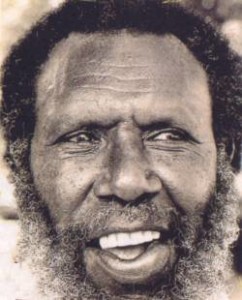 Mabo Day (1992)
Mabo Day (1992)
June 3
Eddie Mabo of Mer island in the Torres Strait spent a decade seeking official recognition of his people’s ownership of Mer and on 3 June 1992, the High Court of Australia agreed, rejecting the doctrine that Australia was terra nullius (land belonging to no-one) at the time of European settlement. Eddie’s daughter, Gail Mabo remembers that day well. More →
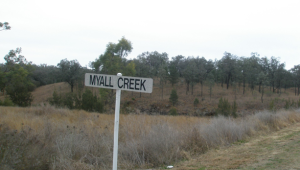 Myall Creek Massacre (1838)
Myall Creek Massacre (1838)
June 10
Late in the afternoon on Sunday 10th June 1838, a gang of eleven convict and ex-convict stockmen led by a squatter, slaughtered a group of some twenty eight Aboriginal men, women and children who were camped next to the station huts on the Myall Creek cattle station in northern New South Wales. Despite the fact that the Myall Creek Massacre was just one of the countless massacres that took place right across the country from the earliest days of British settlement in 1788 through to 1928, it is significant because it was the only time in Australia’s history that white men were arrested, charged and hanged for the massacre of Aboriginal people. More →
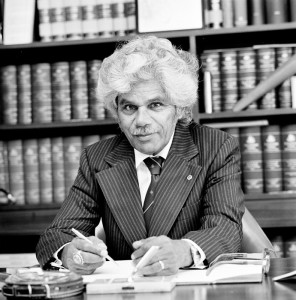 Neville Bonner becomes first Aboriginal to hold a seat in Federal Parliament (1971)
Neville Bonner becomes first Aboriginal to hold a seat in Federal Parliament (1971)
June 11
Following the 1967 referendum, which amended the constitution to give the Commonwealth government the power to make laws in relation to Aboriginals, Bonner joined the Liberal Party. In 1971 he became the first Aboriginal person to sit in the Commonwealth parliament when he was chosen to fill a vacancy in the Senate caused by the resignation of a Liberal senator for Queensland. More →
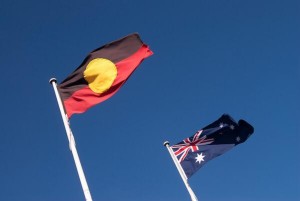 Aboriginal flag first flown in Adelaide (1971)
Aboriginal flag first flown in Adelaide (1971)
June 12
The Australian Aboriginal Flag was first flown at Victoria Square in Adelaide, South Australia, on National Aborigines Day, 12 July 1971. More →
July
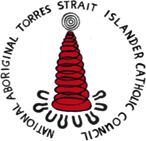 Aboriginal and Torres Strait Islander Sunday
Aboriginal and Torres Strait Islander Sunday
First Sunday in July
Aboriginal and Torres Strait Islander Sunday is a time where Catholics from all over Australia come together to celebrate and acknowledge the gifts that Indigenous people bring to the Catholic Church in Australia. It is also a time to reflect on our own relationships with Australia’s first people. More →
 NAIDOC Week
NAIDOC Week
First Week in July
NAIDOC stands for National Aborigines and Islanders Day Observance Committee. Its origins can be traced to the emergence of Aboriginal groups in the 1920s which sought to increase awareness in the wider community of the status and treatment of Indigenous Australians. NAIDOC Week is held in the first full week of July. It is a time to celebrate Aboriginal and Torres Strait Islander history, culture and achievements and is an opportunity to recognise the contributions that Indigenous Australians make to our country and our society. More →
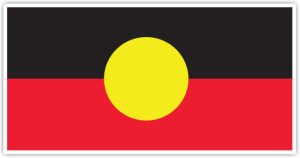 Aboriginal and Torres Strait Island flag proclaimed official flags of Australia
Aboriginal and Torres Strait Island flag proclaimed official flags of Australia
14 July
he Australian Aboriginal Flag was first raised on 12 July 1971 at Victoria Square in Adelaide. It was also used at the Aboriginal Tent Embassy in Canberra in 1972. The top half of the flag is black to symbolise Indigenous people. The red in the lower half stands for the earth and the colour of ochre, which has ceremonial significance. The circle of yellow in the centre of the flag represents the sun. More →
August
 National Aboriginal and Torres Strait Island Children’s Day
National Aboriginal and Torres Strait Island Children’s Day
4 August
National Aboriginal and Torres Strait Islander Children’s Day (NATSICD) is the largest national day to celebrate our children. Children’s day is celebrated across Australia each year on 4 August. Children’s Day, and the week leading up to it, is a time to for Aboriginal and Torres Strait Islander families to celebrate the strengths and culture of their children. More →
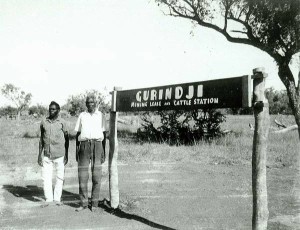 Wave Hill station returned to Gurindji people (1975)
Wave Hill station returned to Gurindji people (1975)
16 August
In August 1966 Indigenous pastoral workers of Wave Hill station went on strike, walking away from poor conditions they had experienced for more than 40 years. The Wave Hill walk-off route was included in the National Heritage List on 9 August 2007. On 15 August 1975 the Gurindji became the first Aboriginal community to have land returned to them by the Commonwealth Government. More →
September
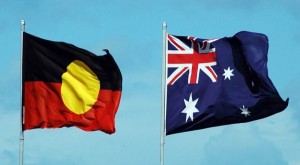 Council for Aboriginal Reconciliation Act (1991)
Council for Aboriginal Reconciliation Act (1991)
2 September
The Council for Aboriginal Reconciliation was established under the Council for Aboriginal Reconciliation Act 1991. The Council worked closely with the Australian Local Government Association to have the issue of reconciliation on the local community agenda. In January 2000, the Council for Aboriginal Reconciliation was replaced with a new private body, Reconciliation Australia. More →
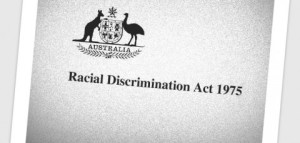 Racial Discrimination Act proclaimed Australia (1975)
Racial Discrimination Act proclaimed Australia (1975)
30 September
Racial discrimination is when a person is treated less favourably than another person in a similar situation because of their race, colour, descent, national or ethnic origin or immigrant status. More →
October
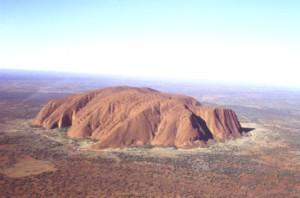 Uluru handed back to traditional owners (1985)
Uluru handed back to traditional owners (1985)
26 October
In 1985, after lengthy negotiations, the Australian Government handed joint management and title of Uluru back to the Indigenous Anangu people on condition they lease it to the Australian National Parks and Wildlife Service. More →
December
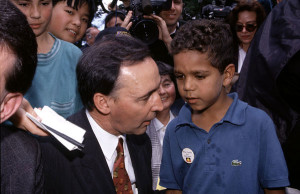 Prime Minister Paul Keating’s speech to launch International Year of the World’s Indigenous people (1992)
Prime Minister Paul Keating’s speech to launch International Year of the World’s Indigenous people (1992)
10 December
“…We simply cannot sweep injustice aside. Even if our own conscience allowed us to, I am sure that in due course the world and the people of our region would not. There should be no mistake about this – our success in resolving these issues will have significant bearing on our standing in the world…More →
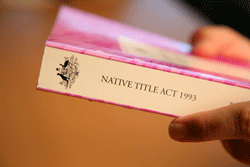 Native title passed in Senate (1993)
Native title passed in Senate (1993)
21 December
In 1992, the High Court of Australia handed down its decision in Mabo v Queensland. The court recognised that the Meriam people of the Torres Strait held native title over part of their traditional lands. The court found that the common law of Australia recognises rights and interests to land held by indigenous people under their traditional laws and customs. The Native Title Act 1993 commenced on 1 January 1994. More →
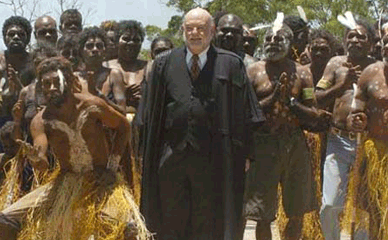 Wik decision (1996)
Wik decision (1996)
23 December
In mid 1993, before the enactment of the Native Title Act 1993 (Cth), the Wik Peoples made a claim for a determination of their native title rights and interests in the Federal Court of Australia in relation to land on Cape York Peninsula in Queensland. The Thayorre People joined the action because they had claimed their native title rights and interests over an area of land which partly overlapped the Wik claim. More →
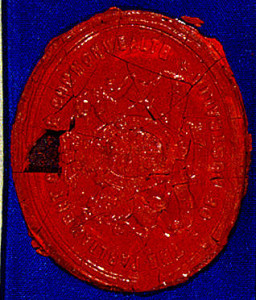 Immigration Restriction Act (White Australia Policy) enacted 1901
Immigration Restriction Act (White Australia Policy) enacted 1901
23 December
On December 23, 1901 the Immigration Restriction Act received Royal Assent. It was the first major piece of legislation passed by the new Federal Parliament, and allowed the new country to exercise the policy of White Australia. The opening lines of the Act state its intent: “To place certain restrictions on Immigration and to provide for the removal from the Commonwealth of Prohibited Immigrants.” More →
